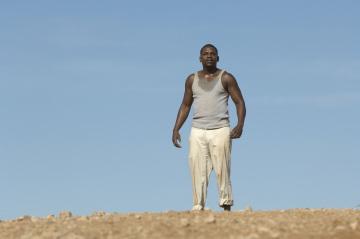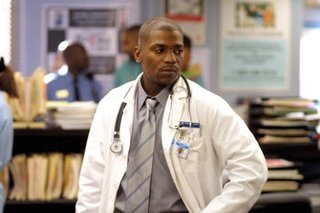(Spoilers. If you are an E.R. fan, missed a few of the last episodes from Season 12 and plan to watch them at a later date, you may not want to read the following).
Avid fan of E.R. Been watching since mid-way through its first season. A few years ago, the shows producers decided to change the scenery from Chicago to Africa. Not the beautiful coasts that we dream of, along with other utopic like images that playfully and forever occupy our minds. No, first one doctor, Luka Kovac, who is Croatian and used to war in his own homeland, went to war-torn Africa in an attempt to heal some personal pain. Soon, another doctor, John Carter, also having some "issues," followed. He, too, is white. As I watched the plot lines unfold from week to week and, eventually, from season to season, I thought, "Damn, are they only letting white folk into Africa?"
Then, four episodes before the Season 12 finale, it happens: a Brother from the "fictional" hospital set in Chicago's inner city would go to Darfur. Ironically, he is sent by the person who began the whole thing: Kovac. Luka wanted to return (to Africa) himself, but with a baby on the way, his girl told him, "Hell, no. You ain't going no where." But somebody had to go. Carter, who worked at County General for several years, was now in Africa semi-permanently and needed help.
Enter Dr. Gregory Pratt, played by Mekhi Pheifer. Pheifer plays Pratt like he has known him all his life. The character's mantra has always been about "doing the right thing," especially when it comes to blacks. This was not something that one of the other main black characters, Dr. Peter Benton (Eric LaSalle), was allowed to do so much. Benton was written as a cold, unfeeling, anti-affirmative action, and typically afraid of commitment type of man. Probably even a Republican. In the beginning, Pratt was an arrogant, cocky hothead hell-bent on looking out for Number 1. But somehow, he has always seemed more compassionate than Benton.
While trying to "right the wrongs" of this world, Pratt made a serious error in judgement. In an honest attempt to keep a kid out of foster care, he rigged the blood test of an alcoholic father, named Darnell. Darnell's very impressionable teenage son volunteers at the hospital and has stayed out of trouble since he got the gig. Pratt figured that the Darnell going to jail would mess things up.
But Darnell continues to drive drunk, almost killing someone. When Pratt realizes what Darnell has done, he makes D turn himself in. Still, Pratt was at fault from jump, and has to admit his mistake to Kovac, who is chief of the emergency room. Of course, there is an unofficial suspension. But Pratt still needs to learn the difference between doing the right thing and being responsible. So when Carter asks for Kovac's help in Darfur, Kovac remembers Pratt; Pratt always wants to do what is right. Going to Darfur is right.
On the plane to Africa, Pratt brags to an African native (Erika Alexander) that having worked in Chicago's County General and being Black, this trip will be a piece of cake. Alexander's character very quietly and sharply breaks things down for Dr. Pratt; the countless murders, serious injuries and rapes. The sickness, hunger, and disease.
Towards the end of her description of what he was about to face, the audio moves to a voice-over and we meet up with Greg as he is about to be challenged at customs, by two of Africa's finest. (Note: Great direction by Skipp Sudduth. He "put his foot in it" with regards to moving from scene-to-scene and handling the action within those scenes). Pratt did not speak the language--at all. However, the brothers in customs immediately let him know, "Punk, you cannot pass through here without our approval." Pratt tries to go toe-to-toe with these cats regarding the contents of his luggage. Of particular concern to them is Pratt's seemingly harmless trashy novel they deem "questionable contraband."
The more Pratt argues, the harder time they give him. The scene reminded me of African-Americans who intentionally step on one another. There are those who have "arrived" and claim not to "hear" the side of those who are struggling to get ahead. Then there are those who could benefit from the tough love that Dr. Cosby has been dishing out recently, but are too arrogant to think that "it's them." Either way, it is the same sort of animonsity seen here; senseless and unexplainable. While watching this, the words of author Zora Neale Hurston came to mind, "Everyone who is my skin folk, ain't necessarily my kin folk."
Debbie, Pratt's escort from the representative from the IDP (Internally Displaced Persons), or refugee camp, realizes that he is probably being detained. Cut to the two of them finally leaving customs and Pratt snaps, "You know it would have helped to have someone who speaks English meet me." Her remark (cannot remember what it was at this juncture), simply tells Pratt, "You ain't in Chicago anymore. This here, is Africa."
The ride to the camp proves quite adventurous. Pratt becomes irrated by the native African driver's selection of music: Sonny and Cher's "I Got You Babe." Next Mr. Arrogant wants to know why there has been no investment in roads. But he would soon come to appreciate the bumpy ride. As they continue, they suddenly, literally, out of nowhere, have company: Janjaweed. These cats are the Bloods, Crips, Klan, and Neo Nazis rolled up into one on crack. Pratt has been the victim of road rage before (Final episode, Season 10). But these guys were on horses and this was not Chicago. There was, to quote the title of this episode, "no where to hide." No side street to turn off onto or building to run inside of; just miles and miles of desert. No bystanders to call the police.
The driver is ordered to stop the vehicle. The Janjaweed assume Pratt is African and try to communicate with him. Once they realize he is "American," they decide to go off on this "cotton-picker" and his friends. They begin to beat the driver; Pratt tries to help and they knock him around a bit, too. In the end, the Janjaweed trash the vehicle, making it inoperable, and take Pratt's shoes. Ironic that Pratt, an African descendant, returns to his Motherland and within a few short hours is challenged by low-level authority figures, gets jacked for his shoes and must now walk barefoot on the road he just moments before criticized. Damn.
 When they finally arrive to the camp, the camera zooms up behind Pratt, whose feet by now are severely blistered and perhaps bleeding. As he looks across the valley at the rows and rows of tents, filled with people, he is shocked. Pratt grew up in Chicago and can handle his own in the hood, but this ain't Cabrini Greene. I could almost hear a remixed version of Jermaine Dupree's song "Welcome to Atlanta," in the background. We'll call this one, "Welcome to Darfur..."
When they finally arrive to the camp, the camera zooms up behind Pratt, whose feet by now are severely blistered and perhaps bleeding. As he looks across the valley at the rows and rows of tents, filled with people, he is shocked. Pratt grew up in Chicago and can handle his own in the hood, but this ain't Cabrini Greene. I could almost hear a remixed version of Jermaine Dupree's song "Welcome to Atlanta," in the background. We'll call this one, "Welcome to Darfur..."But Pratt's day is not over. He gets a lesson on culture when he attempts to give medical attention to a woman who has been raped. Not allowed. He is confused as to why a nurse is helping the victim, who is in major pain and distress, when it is obvious that a doctor is more qualified. He gets a "that's just the way it is" answer from Carter.
Then there is a commotion outside. Abruptly, Gregg is in the midst of a crowd that is beating to death a member of the Janjaweed captured by the men of the camp. But the good Dr. Pratt does not bother to come to this dude's aid. Not because the mob's victim could have been one of the men on the road who robbed and beat him. And not because he didn't want to get involved. But because Greg knows (without anyone telling him) that if he intervenes, the men, some of them just boys, would probably kill him, too. Watching in horror (along with Carter, who has probably seen this sort of thing before, but nonetheless sickened by it), Pratt accepts that "this is just the way it is," in Darfur. The scene ends with a young boy raising a huge rock and violently dropping it on the African gangster's head.
Over two episodes, through different eyes--African-American eyes, viewers saw the realities of what is going down in the Sudan. I cannot say that I am ready to pack my bags and head over there myself. But it was validation that, yes, blacks do in fact give a damn about the murders, rapes, underhanded bullshit and plain idoicy occurring in Darfur. Still, we have some of the same going on right where we are. There is still black on black crime; we still sell drugs to one another. But it doesn't mean we don't know or that we don't care. The same goes for Darfur. We know. We care.

No comments:
Post a Comment